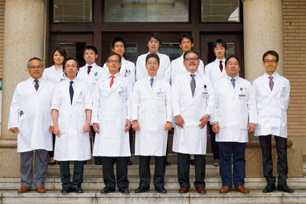Hideyuki Shimizu, Professor, School of Medicine
Protecting the very essence of life (heart and blood vessels) through leading-edge surgery
Our specialist team of cardiovascular surgeons is committed to treating heart and vascular lesions that are difficult to treat with drugs, through the most reliable surgical techniques and cutting-edge technology. The team is also dedicated to training highly skilled doctors of the future.

Cardiovascular surgery is in principle a surgical procedure performed to treat various heart and vascular diseases such as congenital heart diseases, acquired heart diseases (valvular disease of the heart and coronary artery disease), and diseases of the great vessels (aortic aneurysm and aortic dissection). During the surgery—from the moment the heart or blood vessels are incised with a scalpel to when the incision is closed with surgical sutures—it is absolutely essential to block the blood flow in order to control the amount of bleeding. At the same time, stopping the blood circulation for a long period of time can cause organ failure, so we undergo rigorous training in order to carry out sound and accurate surgical sutures in a short time, conduct basic research on organ protection during circulatory arrest, as well as develop better operative methods.
In recent years, we are experiencing a major paradigm shift from traditional surgery toward minimally invasive surgery, which is a form of treatment that is designed to reduce the traumatic effects of surgery on the patient. We are actively applying state-of-the-art medicine such as the following: cardiac surgery requiring only a very small incision (MICS); aortic stent graft procedure that does not involve an incision on the main body or the use of a heart-lung bypass machine; hybrid cardiac surgery that combines open-heart surgery with a less invasive endovascular approach; and the Transcatheter Aortic Valve Replacement (TAVR).
From now on, this shift toward minimally invasive surgery based on the utilization of catheters will occur at a faster pace, and instead of a mono-disciplinary approach to major cardiovascular surgery, surgeons will instead become increasingly part of a multi-disciplinary “heart surgery team” performing minimally invasive surgery. And as part of this shift, we should also start seeing a greater demand for more advanced surgical techniques and the ability to respond quickly to emergencies in order to ensure safety and carry out radical treatments with a high success rate. This heart surgery team transcends traditional boundaries between doctors, nurses, clinical engineers, and so on, comprising a wide range of experts who can offer specialist knowledge and skills in their respective fields to provide the best possible medical care to treat cardiovascular-related diseases.
We are also committed to nurturing future cardiovascular surgeons equipped with skills and techniques of the highest level, and by building on our comprehensive and fully integrated capabilities of the Keio University Hospital, we will combine technical skills with cutting-edge medical technology to create a safe and high-quality system of treatment. Having studied at Keio University, building teamwork is what we do best, and we are convinced that creating a medical team of the highest caliber embodies the true spirit and principle of Keio University.
Student’s Voices
Akinori Hirano
Fourth-year doctoral program, Graduate School of Medicine
Team Work and Hangaku Hankyo (Learning while Teaching, Teaching while Learning)
The distinct features of our laboratory are minimally invasive surgery for our clinical medicine practices and translational research (a field of medical research that aims to translate scientific discoveries into practical application) on regenerative medicine and the development of state-of-the-art medical equipment using large animal models. In terms of education, we not only undergo regular training at the hospital, but also learn basic surgical techniques. We are also given the opportunity to present at academic conferences, and two Keio students have received awards for their research. Nurses and other medical professionals teach and learn from each other every day, and through this process we are refining and improving the quality of our medical team. I am reminded every day that good coordination among the cardiovascular surgery team, which is essential for the success of these new medical treatments, is being cultivated through the spirit of hangaku hankyo.
*Position titles, etc., are those at the time of publishing.
